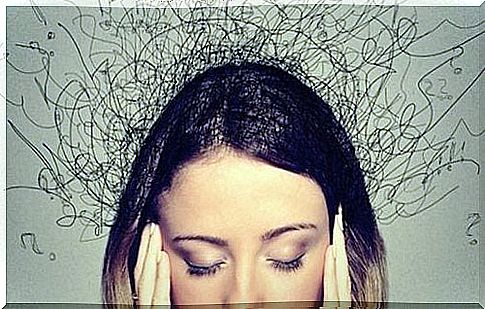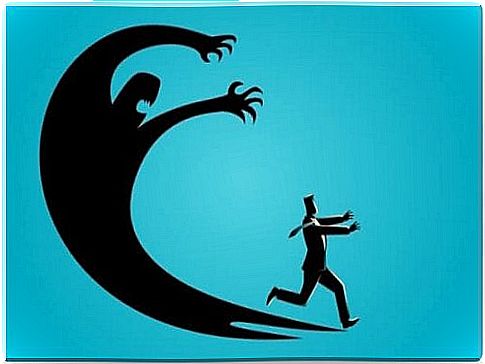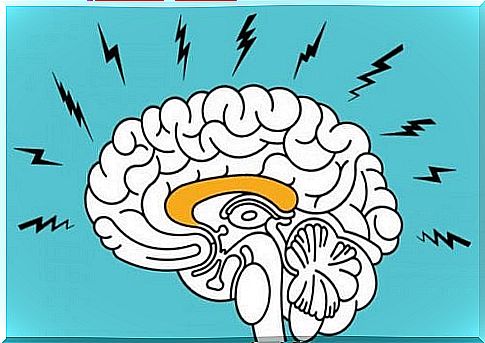The Effects Of Anxiety On The Brain: Do You Know Them?

The effects of anxiety on the brain are significant. Cortisol, adrenaline and norepinephrine all make you alert and ready to defend yourself. It does not take long before you are overwhelmed by irrational thoughts. Fear invades and paralyzes you.
Other emotions cause your reality to be obscured, as during a cold night without a moon. Honestly, there are not many other psychological conditions that are as intense as anxiety.
Demographic studies are telling and apparently there are many who live with chronic anxiety. For them, there is no other way to experience and process reality. They allow themselves to be whipped by unbridled anxiety and do not know how to deal with it.
But there are also other people who suffer from what is called situational anxiety. It involves such things as public appearances, job interviews, exams and even interactions with others. These are all situations that can make your brain raise a red warning flag.
We have all suffered from anxiety at one time or another. It is a natural human reaction. In the right doses, anxiety can actually help you in your quest to reach your goals. The problem is that we often completely lose control of it. It does not take long before it takes over your life, sometimes without you even noticing it. When this happens, everything becomes distorted and messy, like a painting by Kandinsky.

If you really want to understand the effects of anxiety on the brain, you must first be aware of one thing. There is a difference between anxiety and stress. Stress has e.g. to do with a physiological process triggered by various external factors. In other words, there is always a special reason for it. It can be pressure at work, overbooked calendars, problems at home, etc.… In short, stress arises when you realize that you “lack the resources” to deal with all these stimuli.
Anxiety, on the other hand, is much more complicated. It may be true that anxiety is often a by-product of stress, but many times you also experience it without knowing why. It comes from somewhere inside. It reappears again and again when you are having a hard time. It is a physiological reaction that prepares you to flee or to face a threat ( real or imagined ).
This is what separates anxiety from stress. This also makes the anxiety much more difficult to manage, depending on what happens in your brain when you experience it. We will now take a closer look at this.
The amygdala is a small structure at the back of the brain. It is the part that processes and interprets all sensory signals coming from your surroundings. It is also the part that warns the brain when there is something threatening or dangerous that you need to protect yourself from. You could say that it is your instinctive (and sometimes irrational) sensor for common phobias such as spiders, darkness, heights, etc.

Hippocampus
The hippocampus is the part of the brain that is connected to emotional memories. If anxiety has a prolonged, intense effect on your brain, then this is one of the parts that will feel the effects the most. It decreases in size, leading to many other serious side effects. Things like memory loss, difficulty concentrating and even post-traumatic stress disorder are all common consequences of this problem.
Post-traumatic stress is very common in abused children, who have lived under the terrible weight of feeling constant fear and worry about being in danger.
In fact, a short time ago, the journal Neuron published an extremely interesting and hopeful study. Researchers have discovered that the cells responsible for anxiety are actually located in the hippocampus. It is now hoped to use this discovery to develop better treatment methods for anxiety.
Restlessness, anxiety, muscle tension and tachycardia are all side effects of some specific neurotransmitters. The effects of anxiety on the brain are directly linked to the unmistakable (and dreaded) combination of cortisol, norepinephrine and adrenaline.
The amygdala first identifies the danger and then these neurotransmitters make you react. Your brain wants you to protect yourself, by either escaping or reacting in some other way. One consequence is that more blood is pumped to your muscles. Your heart beats faster and more air is sent to your lungs. This emergency preparedness can, of course, be of real benefit if there is actually a threat. However, if this is not the case and you are constantly activating this physiological process, this can give rise to problems. You may have digestive problems, headaches, high blood pressure and impaired blood flow to the brain.

As we mentioned at the beginning, anxiety is a physiological reaction. So it is not enough that you say to yourself: “Take it easy, everything will be fine”. If your brain determines that there is a danger, it does not help much to try to reason away the emotions. Therefore, you must first address the physiological, the physical aspects of the problem.
- Convince your body that there is no danger. How? Practice relaxation exercises, such as deep breathing. “Pause” your body, so that even your brain calms down.
- Use anxiety to your advantage. Anxiety management is not a matter of willpower. You can not just make this psycho-physiological reality disappear from your brain. You need to get through it and take advantage of what it has to offer you. Artistic therapies are a great way to help you do that through visualization. Ceramics and painting are two of the best art forms to get an outlet for anxiety. They can transform a horrible monster into a much smaller and more manageable creature, which is not as scary.
- New habits, new routines. Doing something different in your daily routines can change everything. You can take walks, go to a concert every week, meet new people, sign up for a yoga class… All of this can change your brain’s warning system and make you look at things differently.
Finally, do not hesitate to seek help if you do not succeed in counteracting the effects of anxiety on the brain. No one deserves to live in fear. No one should have to live like a prisoner of chronic anxiety, which makes life so gloomy.









